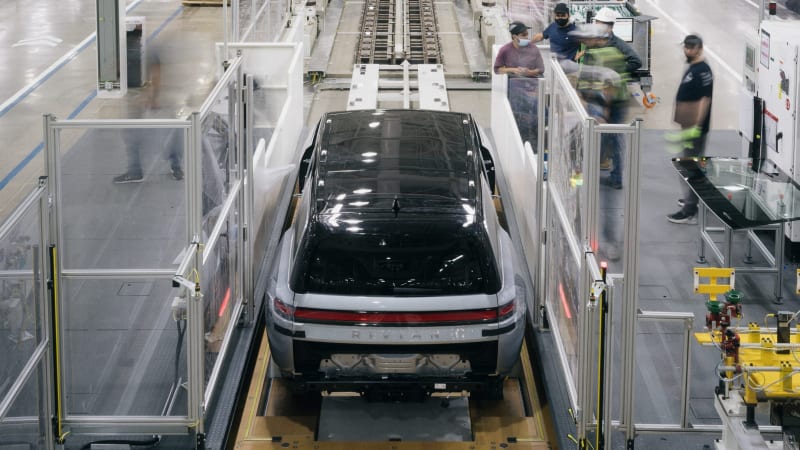Rivian runs the risk of alienating customers who have been waiting years for their vehicles

- Rivian’s earnings this week missed analyst expectations.
- The EV startup is planning to make fewer cars this year than many anticipated.
- Rivian runs the risk of alienating customers who have been waiting years for their vehicles.
Rivian is facing a challenge to win back some of its earliest supporters as the burgeoning electric-vehicle maker continues to struggle with building enough cars to meet demand.
The startup, which already missed production goals in 2022, provided a lower build goal for 2023 than analysts had anticipated, at 50,000 pickup trucks, SUVs, and delivery vans.
As Rivian continues to struggle with mass production, its communication with customers who have been waiting for years now for their vehicles is leaving some feeling burned by the company.
Parker Elmore placed his order for the R1S SUV more than two years ago. He’s hedged his bet on Rivian with orders for the Tesla Cybertruck and the electric Ram 1500.
“I’d be lying if I said there’s not some trepidation of: is this company going to make it?” Elmore told Insider. “You put all the orders in because you just don’t know who’s going to actually win or deliver.”
Insider has spoken or corresponded with about a dozen order holders in recent months. Some feel embarrassed by their early support of Rivian while their wait times increase to nearly half a decade. Some waiting customers and shareholders have compared Rivian’s struggle to reach mass production to that of Tesla, which managed to muddle through “production hell” in 2018 without alienating its most fanatic supporters and emerging as the most valuable automaker in the world.
Rivian has previously said timing of deliveries is “based on a number of factors, including delivery location, configuration and original preorder or reservation date.” A spokesperson also said customers experiencing delays have been connected with customer service.
For a young company like Rivian, which doesn’t have a lot to spare on marketing costs, these early fans can make or break your reputation, shareholders and analysts said.
“The auto industry is notorious for customers that have intense brand loyalty,” Garrett Nelson, an automotive analyst for CFRA Research, told Insider. “For a newcomer like Rivian, it’s this huge challenge to break in when you have no brand, and you’re just starting to establish that relationship and trust with customers.”
This crack in trust between Rivian and some of its early order holders is coming at the worst possible time for the company, Nelson said, as Wall Street was disappointed not only by a modest production goal for the year, but also a lack of transparency on where the company’s pre-order list stands.
“We’re starting to see how difficult some of these speed bumps are for companies like Rivian,” he said. “We’ve seen some really disappointing results from Rivian and Lucid as they ramp up their production a lot slower than a lot of investors and customers would like to see.”
Rivian posts mixed Q4 results
Rivian presented mixed results for the fourth quarter on Tuesday, losing less per share than analysts had expected, but falling short of revenue estimates. Investors and customers remain concerned about the EV startup’s ability to deliver on its ambitious promises.
Rivian narrowly missed its production goals in 2022, making 24,337 cars and delivering 20,332. Meanwhile, deliveries have lagged but not nearly to the extent fellow startup Lucid‘s have. About 84% of Rivian’s vehicles built made it to customers last year.
Rivian plans to build 50,000 vehicles in 2023, though some analysts expected at least 60,000. The company has the most cash of other EV startups, with $11.6 billion on hand, but even with some good news, investors are running out of patience.
Shares fell some 83% in 2022, and sank another 17% in trading Wednesday following the news.
Wedbush analyst Dan Ives said in a note following earnings results that it’s disappointing that “Rivian remains in this spider web of production issues with the worry that customers will start to churn to competitors.”
While some order-holders like Elmore remain cautiously optimistic, others who have taken delivery of their Rivians appear to be happy with the vehicles.
Earlier this week, Rivian topped JD Power’s EV ownership study. And David Dvinov, a New Jersey-based founder of a trucking company, received his R1S last month after placing his order in October 2019. Dvinov said he’s glad he waited the more than 3 years that it took.
Rivian’s challenge lies in delays
Rivian did not report its pre-order number in its latest quarterly report. The company had 114,000 net pre-orders as of November 7. (In its earnings, Lucid also announced plans to stop reporting its number of reservations.)
Rivian’s juggling its first pickup and SUV, 100,000 delivery trucks for Amazon, a charging business, and even a potential foray into the electric bike space, amid a challenging macro environment and hobbling supply chain constraints.
This long list of priorities is frustrating to order holders who have been waiting since 2019 for their Rivians to arrive.
Both Rivian’s production and delivery progress were slower from Q3 to the last quarter of the year than they were from Q2 to Q3; Rivian attributed losing multiple days of production in Q4 to supplier shortages.
In an email to the company announcing its second round of layoffs in seven months, CEO RJ Scaringe also emphasized the need to focus.
That’s crucial as Rivian has not only delayed thousands of customers receiving its flagship products, but it also had to push the launch of its smaller, more-affordable, next-gen R2 platform to 2026.
Are you a current or former Rivian employee, Rivian vehicle owner, or Rivian order holder? Contact these reporters at nnaughton@insider.com and astjohn@insider.com.
